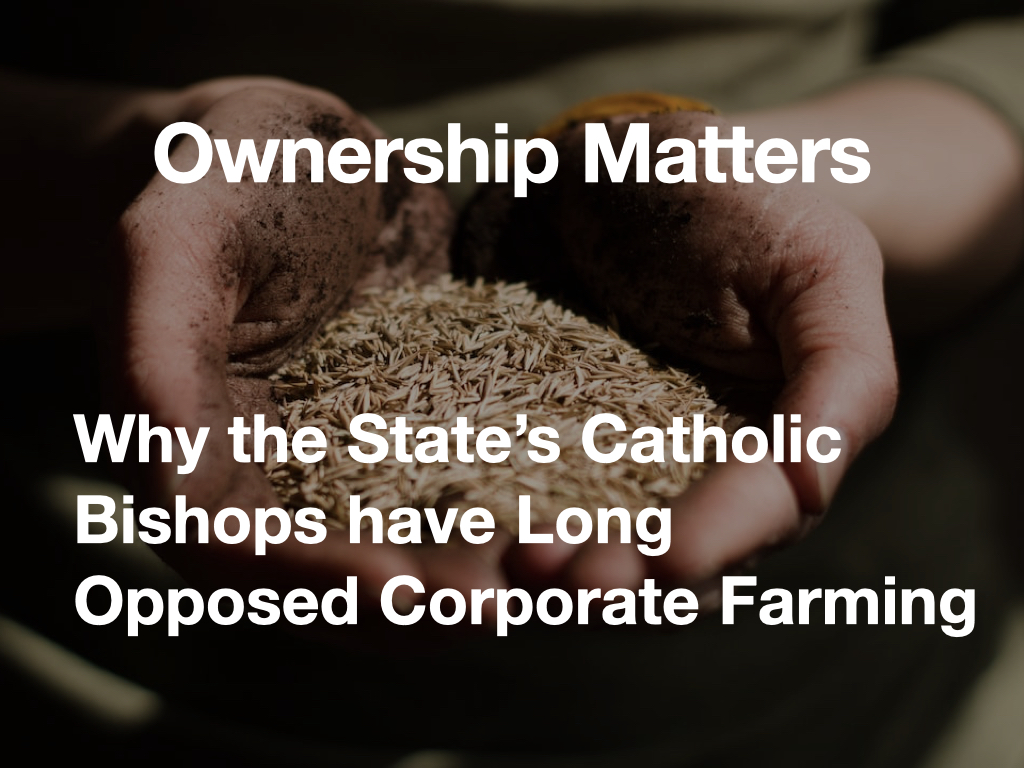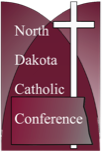
Farming: Yes, Ownership Matters
By Christopher Dodson
Executive Director
North Dakota Catholic Conference
January/February 2023
Attempts to repeal or eliminate parts of the state’s anti-corporate farming law will reappear during this year’s North Dakota legislative session. The law prevents outside investor ownership of farms, ranches, and related operations in North Dakota. The last time legislators passed a change in the law was in 2015. Voters later overwhelmingly rejected the law by nearly seventy-six percent of the vote. One could be forgiven for asking what part of “no” did they not understand.
A person could also be forgiven for not understanding why the Catholic bishops of North Dakota oppose repealing or weakening the law. The position is not new. By my estimate, I have testified at least seven times on behalf of the bishops against bills to repeal or weaken the law. My predecessor did as well. Indeed, opposition from North Dakota bishops to corporate farming goes as far back as 1939, and maybe earlier.
As I wrote in an article published in the National Catholic Bioethics Quarterly, Fargo Bishop Aloisius Muench — the only North Dakota bishop named a cardinal — wrote in 1939 that practices such as “investor ownership and the use of wage laborers embraced concepts of ownership and labor more consistent with socialism and unbridled capitalism than the principles of economy proposed by Pope Leo XIII in Rerum novarum and Pope Pius XI in Quadragesimo anno.”
This constancy by our episcopal shepherds on this issue demonstrates that the bishops' opposition to repealing or weakening the law is not the result of a particular bishop’s personal opinion. Instead, it is something deeply rooted in Catholic doctrine.
Catholic social doctrine contains many principles that lead to this position, but there are several that are particularly relevant.
First is the dignity of the human person. This is the fundamental principle of all Catholic social doctrine. Everything in the social order, whether it is government, economics, business activity, or the community should be centered on the human person.
Second, the dignity of the human person is best protected and fostered within the family. Families play a role that cannot be replicated and that role extends to our economic activity.
Third, the principles of subsidiarity and the dignity of work teach that decisions, whether they are governmental or business, should be made by those closest to the activity itself.
Finally, Christian tradition recognizes that there is something unique about farming and ranching. We can find the roots of this recognition in Sacred Scripture, starting with God’s charge to man to “cultivate and care” for the land. (Gn 2:15). This special nature of farming stretches throughout Scripture and through Catholic teaching.
For these reasons, the church calls farming a vocation, rather than a mere economic activity or business. Indeed, the International Catholic Rural Association and Catholic Rural Life prepared a several-page long “reflection” entitled Vocation of the Agricultural Leader. (Bishop John Folda of Fargo serves on the board of Catholic Rural Life.)
That document explains it this way:
“The farmer, therefore, holds a crucial place in the common family of man and a unique role in the fulfillment of God’s plan. Through their determined labor, those who work in agriculture cooperate with divine providence and make manifest God’s care for each one of his children. Their work is not merely an effort to meet a basic human necessity. Nor is it just an economic endeavor, reducible to solely questions of profit and cost. Instead, at its core, the commitment to agriculture is a vocation given by God, a unique and privileged way of life. Indeed, of all the occupations undertaken by men and women, the task of “cultivating and keeping the earth” (Gn 2:15)—farming and ranching—reaches to the depths of our relationships with God the Creator, with creation and with all of humanity.”
As Pope Francis said, farming is different because it is “characteristically and fundamentally human.”
The further we move away from family ownership of the land and operation, the further we move away from that uniquely human connection inherent in God’s charge to cultivate and till the earth. The further we move the decision-making of how to engage in agriculture from the people who do the actual labor, the further we move away from respecting the dignity of labor and respecting the local community. The further we embrace the notion that farming is only about profit, the further we move away from God’s call to steward land and resources for the common good and for future generations.
As the Vocation of the Agricultural Leader puts it, the danger is that the farmer or rancher will become “a mere economic agent of production” rather than someone engaging in a vocation to humbly cultivate and keep the earth and play a critical role in creating an authentic culture of life.
What We Do
The North Dakota Catholic Conference acts on behalf of the Roman Catholic bishops of North Dakota to respond to public policy issues of concern to the Catholic Church and to educate Catholics and the general public about Catholic social doctrine.

Contact Us
North Dakota Catholic Conference
103 South Third Street, Suite 10
Bismarck, North Dakota
58501
1-888-419-1237
701-223-2519
Contact Us

